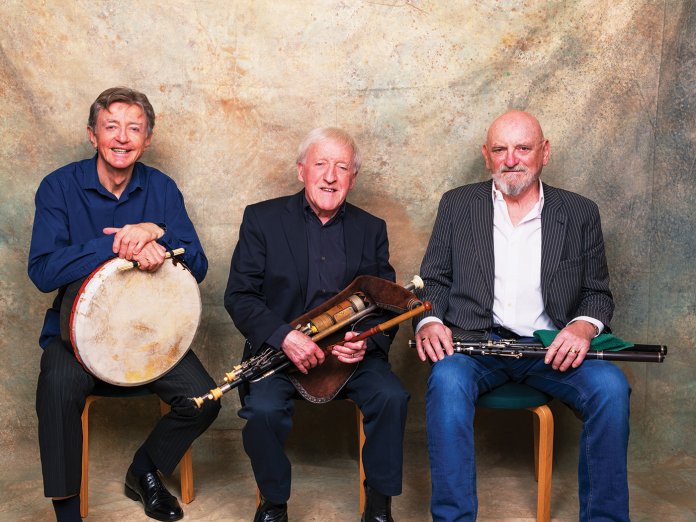Perhaps it’s only now, with the passing of founder Paddy Moloney, that we can appreciate the enormity of The Chieftains’ achievement. Their longevity and profuse output (44 albums) are cause for celebration, but their real legacy is the transformation of Irish music from a backwater interest to a world-conquering force. It’s hard to understand, in an age when all things “Celtic” are a powerful strand in popular music, but when the Chieftains formed in 1962 – a collection of enthusiastic part-timers – Irish folk had little respect even at home. Inspired by the short-lived composer Sean O’Riada, who aspired to ally the beauty and mystery of folk with classical tradition, and with whom Moloney started his career, The Chieftains re-purposed their native tradition for modern times, becoming hugely influential on a new generation of musicians – Horslips, Planxty, the Bothy Band – and ultimately on their nation’s idea of itself.
Chronicles provides an admirable résumé of the band’s career, mixing tracks from all eras with live performances and collaborations with guest singers – songs always took second place to the purity of instrumentation and the grail of Irish classicism. In performance, they could sound more like an orchestra than a six-piece, and when the bodhran started to thump and twirl, and the pipes and whistles to wail, they rocked; try “Boil The Breakfast Early” from 1981’s Cambridge Folk Festival.
Alongside the jigs and reels, often taken at a manic pace, came the lyrical airs, highlighting the intricate, haunting Uillean pipes of Moloney. The addition of Derek Bell’s harp for 1973’s Chieftains 4 proved pivotal, supplying a gentle counterpoint to the shrill whistles and pipes. The otherworldly “The Women of Ireland (Mna Na hEireann)” on Chieftains 4 remains a defining moment. Written by O’ Riada, its presence on Stanley Kubrick’s Barry Lyndon helped awaken North America’s Irish diaspora, formerly fed on the shamrockery of the Clancy Brothers, to the real deal.
A steady stream of albums and success beyond the folk faithful didn’t bring much innovation, though 1983’s visit to China saw them dabble with fusion. Meanwhile, the mainstream was heading for peak Celtic – Clannad, The Pogues and eventually Enya, The Corrs and the dreaded Riverdance. 1988’s meeting with Van Morrison on Irish Heartbeat was a glorious alliance of talents, though it’s unrepresented here aside from a 1999 live version of “Star Of The County Down”. After that the collaborations proliferated; expeditions to Galicia and Nashville, Sinéad O’Connor as Edwardian waif on “The Foggy Dew”, Bon Iver’s spectral “Down In The Willow Garden”, Mick Jagger’s preposterous Deep South drawl on “The Long Black Veil”, Alison Krauss desolate on “Molly Bán (Bawn)” are among the highlights here. A trove of Celtic treasure.



